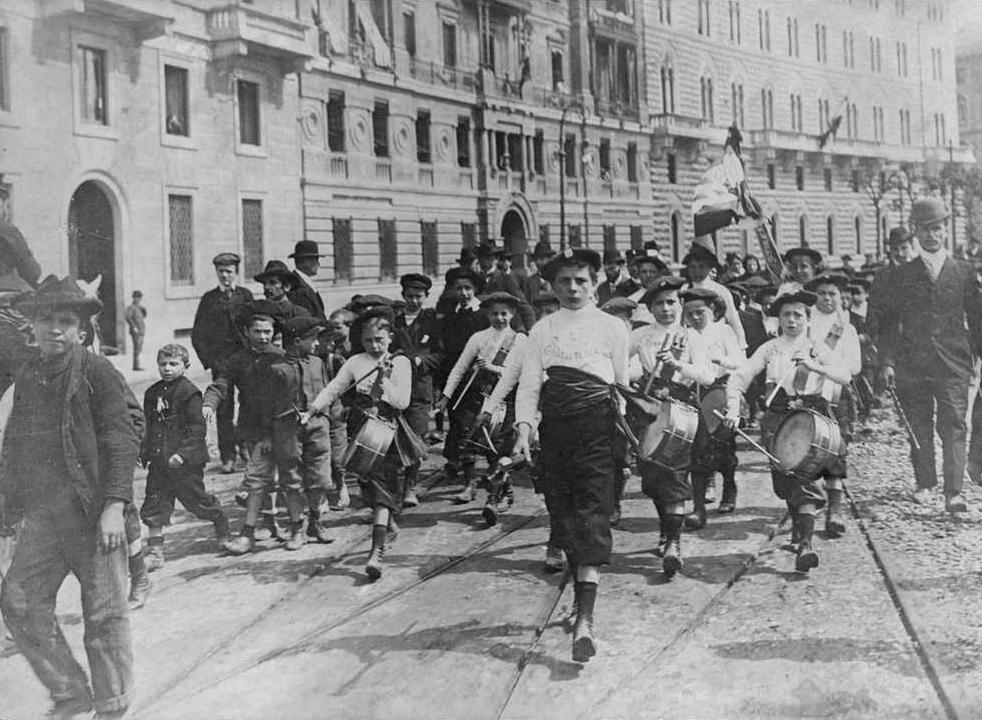
World War I: Italian Debate over Entering the War (1914-15)

Figure 1.-- This appears to be a pro-War demonstration in Italy. Many Italians did not want to enter the War. The Socialists and an subsrabtial part of the working-class opposed the War. The nationalists and the urban middle-class were the groups which were the most interested in entering the War.
|
|
A debate erupted in Italy with the outbreal of the World War I. The Government's decision not to honor the Treaty commitments with the Central Powers seems to have been well received. And there was considerable oposition to war in Italy. Many Italians, especially the Socialists, wanted no part of the War. Many Socialists, Catholics, pacifists, and republicans spoke against Italian participation in the War. The peasantry was apathetic. It was Italian nationalists who wanted to enter the War. The nationlist sentiment was strongest among the urban middle classes. They tended to see the goal to be achieved as national unity and the 'liberation' of Trento and Trieste. [ Vigezzi] Austria held substantial territory with Italian ethnic populations and the nations desired to annex these territories. In a day before public opinion polling, it is difficult to know prcisely just how public opinion broke on the War. But most authors suggest that a majority of the population wanted to stay out of the war. While most Socialists were agasinst the war, some younger Socialists with nationaltic views were more favorably disposed. Among them was a young Benito Mussolini. Mussolini like other Socialists at first opposed the War. He wrote, "Down with the war. Down with arms and up with humanity." Within a few months, however, he changed his mind, and began describing the War as "a great drama". He wrote, "Do you want to be spectators in this great drama? Or do you want to be its fighters?" He would echo these sentiments again two decades later. As a result, the Socialists expelled Mussolini from the party. There were some Socialists that agreed with Mussolini, especially the younger generation that was more moved with nationalists appeals. It became common after the war to see Fascism and Socialism/Communism as opposites ends of the political spectrum. In fact, the Fascists attractes considerable support from Socilists and a considerable part of their program included Socialist fetures. The NAZIs referred to themselves as National Socialists. The Italian Fascists did not use their term, but in fact national socialism was a good description of their program. The Government in essence maintained a neutral status while waiting to see which side was likely to prevail and could offer the most. This proved to be the Allies.
Sources
Vigezzi, Brunello. Da Giolitti a Salandra (Florence: 1969).
CIH -- WW I

Navigate the CIH World War I Section:
[Return to Main World War I Italian page]
[Return to Main World War I country page]
[Return to Main World War I conduct page]
[Return to Main Italian page]
[About Us]
[Aftermath]
[Alliances]
[Animals]
[Armistace]
[Biographies]
[Causes]
[Campaigns]
[Casualties]
[Children]
[Countries]
[Declaration of war]
[Deciding factors]
-------[Diplomacy]
[Economics]
-------[Geo-political crisis]
[Home front]
[Intelligence]
[Military forces]
[Neutrality]
[Pacifism]
[People]
[Peace treaties]
[Propaganda]
[POWs]
[Russian Revolution]
[Terrorism]
[Trench warfare]
------[Technology]
[Weaponry]
[Bibliographies]
[Contributions]
[FAQs]
[Images]
[Links]
[Registration]
[Tools]
[Return to Main World War I page]
[Return to Main war essay page]
[Return to CIH Home page]
Created: 6:44 AM 2/12/2017
Last updated: 6:44 AM 2/12/2017



